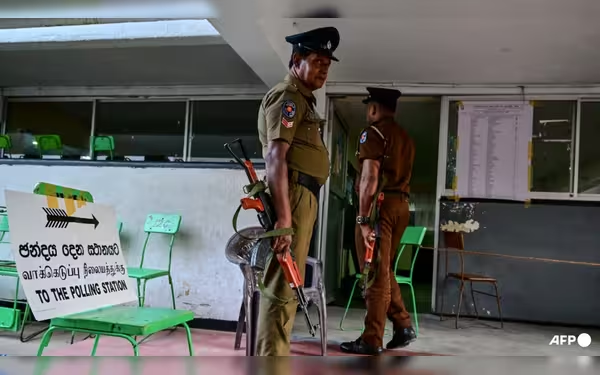Saturday, November 16, 2024 05:31 PM
Sri Lanka's Pivotal Presidential Election Post-Economic Collapse
- First election since economic collapse in Sri Lanka
- Wickremesinghe seeks mandate amid austerity measures
- Voter turnout reflects public discontent with governance
 Image Credits: channelnewsasia
Image Credits: channelnewsasiaSri Lanka votes in its first presidential election since the economic collapse, with high stakes for governance and recovery.
On September 21, 2023, Sri Lanka held its first presidential election since the country faced an unprecedented economic collapse that led to the ousting of former President Gotabaya Rajapaksa. This election is seen as a crucial moment for the nation, as it serves as a referendum on the unpopular austerity measures imposed by the International Monetary Fund (IMF) following the financial crisis. With nearly 70 percent voter turnout reported an hour before polling stations closed, the election has drawn significant attention both locally and internationally.
President Ranil Wickremesinghe, who has been in office for two years, is seeking a fresh mandate to continue the strict economic policies that have stabilized the country after months of severe shortages of food, fuel, and medicine. Wickremesinghe, 75, expressed confidence in his leadership, stating, "I've taken this country out of bankruptcy. I will now deliver Sri Lanka a developed economy, developed social system and developed political system." However, his administration's tax hikes and other measures, part of a $2.9 billion IMF bailout, have left many citizens struggling to make ends meet.
Among Wickremesinghe's challengers are Anura Kumara Dissanayaka and Sajith Premadasa, both of whom have gained traction by promising to address the widespread corruption that has plagued Sri Lankan politics. Dissanayaka, the leader of a once-marginal Marxist party, has seen a surge in support due to his commitment to changing the island's "corrupt" political culture. He stated, "After the victory there should be no clashes, no violence. Our country needs a new political culture." Meanwhile, Premadasa, the son of a former president assassinated during the civil war, has vowed to combat endemic corruption and renegotiate the terms of the IMF rescue package.
Political analysts suggest that predicting a winner in this three-way race is challenging, as no candidate is expected to secure the necessary 50 percent of the vote to win outright. If this occurs, officials will count second- and third-preference votes to determine the winner. Murtaza Jafferjee from the think tank Advocata noted, "There is a significant number of voters trying to send a strong message ... that they are very disappointed with the way this country has been governed." This sentiment reflects the widespread public anger over the economic hardships faced by many Sri Lankans since the peak of the crisis two years ago.
As the election unfolds, it is important to recognize the broader implications for Sri Lanka's future. With over 17 million eligible voters and more than 63,000 police deployed to ensure a smooth voting process, the stakes are high. The government has even banned the sale of liquor during the election weekend to maintain order. The results of this election will not only shape the immediate political landscape but also determine the direction of Sri Lanka's economic recovery.
The outcome of this election will be pivotal for Sri Lanka as it navigates the challenges of rebuilding its economy and restoring public trust in governance. As citizens cast their votes, they are not just choosing a leader; they are also expressing their hopes for a better future. The world watches closely, as the decisions made in this election will resonate far beyond the island nation.













